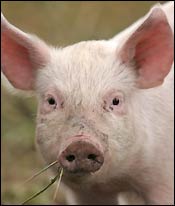
This is one of those believe it or not articles that call your attention both to the specific incident and the wider implication. Out in California, their castrating live pigs in school classrooms as part of the kids education. Some education. The defense of this action, which occurs with no anesthesia I might add, is that it happens every day, that it is do different than dissecting frogs, and that this is no worse than what happens in the production of food. Some defense. I could do without dissecting frogs and torturing and killing animals for people to eat. But that's just me.
Anyway, the following comes to us from the Bakersfield Californian.
Animal activists protest classroom pig castration
Animal activists nationwide are directing their fury at a small Kern County high school where a teacher castrated a live pig in front of her class.
Letters of protest from across the country have been pouring in to Rosamond High School and the Southern Kern Unified School District offices since People for the Ethical Treatment of Animals posted an alert about the incident on its Web site.
District Superintendent Rod Van Norman said such animal castrations are merely a reality of managing livestock and a valuable skill to teach students taking the agriculture elective.
PETA officials and other animal activists disagree, calling the classroom castration, which was done without anesthesia, cruel and disturbing.
“We’re concerned not only because animals suffer during these routine castrations but also because of the message it sends to students who are still forming opinions about treatment of animals in our society,” said Stephanie Bell, a cruelty case worker for PETA.
She declined to say how PETA found out about the castration, citing reasons of confidentiality, but she said it was someone with firsthand knowledge of the event.
A secretary at Rosamond High School said Tuesday the principal and agriculture teacher did not wish to comment on the issue.
Van Norman said animal castrations have been happening in the classroom as long as he can remember. He said the lesson is in the same vein as those that involve dissecting frogs and cats, and students can leave if they don’t want to participate.
“It goes on every day. If you think about where your food comes from, this is what happens,” Van Norman said. “I don’t know why they’re picking on a little school district.”
Charles Parker, assistant state Future Farmers of America adviser at the California Department of Education, said Rosamond is not the only school that does live animal castrations in the classroom.
He said pig castrations are extremely commonplace in the livestock industry. Castrations are used to calm male animals, prevent them from breeding and improve meat quality, he said.
Parker said castrations cause no long-term harm to pigs, and anesthesia is not normally used during pig castrations.
Pig castrations aren’t a required part of agriculture education curriculum, Parker said, but it can be taught at school districts’ discretion.
“There are some teachers that will enhance the basic curriculum with some hands-on skills that are done in the industry,” Parker said.
Still, many animal activists aren’t buying the district’s explanations.
“Clearly, slicing into an alert pig’s scrotum to extract his testicles while he writhes in distress is merciless and brutal,” Jason Williams of Poughkeepsie, N.Y., wrote in a letter to district and Kern County officials.
“Pigs are highly intelligent, sensitive creatures,” wrote another letter writer, Carol Hobbs, from Michigan. “The mutilation of sentient animals does not belong in our classrooms ... and we wonder why so many young people display so much violence!”
Bell said PETA is “heartened” that the issue has gained so much attention. She said PETA hopes the district will reconsider teaching castration in the classroom.
Van Norman said he has no such plans. The district has received letters about the castration from activists throughout the country, but no complaints from parents of children in the district, he said.
“They’ve been doing it since probably before I was in school,” Van Norman said. Bell said tradition is no excuse.
“Just because this is the way it has always been done as a part of agriculture programs,” Bell said, “does not mean it has to continue to be way it is done.”
1 comment:
Poor pig. Some people are so disgusting.
Post a Comment